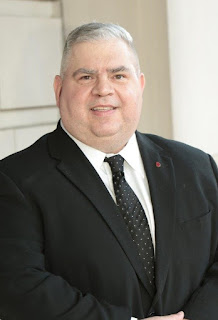Home Parish: St. Nicholas,
Wilkes-Barre
Year of Study: Pre-Theology I at Pope
St. John XXIII National Seminary, Weston, MA
What are some of the factors that led to your
decision to enter the seminary and discern the question of a vocation to
Diocesan Priesthood?
I’ve felt a call towards Diocesan Priesthood
ever since I was twelve years old. I was an altar server at Holy Saviour
Parish in the East End section of Wilkes-Barre. A number of good priests, most
notably Father John Green, Father John Albosta and Father Robert Burnett,
encouraged me to listen carefully to that “still, silent voice within” that
often indicates the movement of the Holy Spirit towards any vocation in life,
be it single, married, religious or priesthood. This ‘voice’ became more
pronounced all throughout my high school years, particularly through my
continued involvement as an altar server, lector and catechism instructor, as
well as through my participation in the diocesan Chrism program at Fatima
Center. I’d have to say that the single biggest factor in my on-going
discernment was Father James Nash from St. Faustina Parish in Nanticoke, who at
the time I knew as Mr. James Nash, my English teacher at Coughlin High
School. He taught a course on the Bible as Literature that I took my
senior year, and this course helped instill in me a love of the Word of God that
I’ve held dear ever since. The year after I graduated from Coughlin,
Father Nash retired from teaching and entered Blessed John XXIII Seminary in
Weston, Massachusetts, now Pope Saint John XXIII Seminary, where I presently
study. Even though it would take me another thirty-two years to
eventually enter the seminary, Father Nash’s encouragement, personal example,
and love of the Church were truly ‘lights unto my feet’ to always stay open to
the possibility of priesthood. What Blessed (soon to be Saint) Mother
Theresa of Calcutta once said certainly rings true to me, “God writes straight
with crooked lines.”
What do you like most about being a
seminarian?
Having sacred time and space to genuinely
grow in holiness and deepen our relationship with God is a privilege. As Father
Don Williams, Diocesan Director of Vocations and Seminarians, once so
beautifully told me, “the most important thing we do in the seminary is
endeavor to become as close to God as possible.” To have this unique
opportunity to grow in faith, hope and love before the Lord is something I will
be forever grateful for and will humbly cherish no matter where God leads me in
life.
What is the role of prayer in your life?
Prayer is the lifeblood of any Christian,
even more so a seminarian. One of the most important factors of any good
relationship is open, honest and frequent communication, and prayer is how we
communicate with God. The centerpiece of every day for me is the Hour of
Great Mercy: 3 p.m. to 4 p.m. I reserve that hour to pray the Chaplet of
Divine Mercy, Stations of the Cross and the Passion Prayers of St Bridget. I
always leave the chapel with a sense of peace and gratitude for having
reflected on the wonder of God’s infinite mercy towards us. I attend Mass
and pray the Divine Offices in community or privately as the daily schedule
dictates while praying five or more decades of the Rosary throughout the
day. For me, prayer is the fuel that keeps the fire of the Spirit inside
me burning brightly.
What are some of your hobbies?
Reading, walking, weightlifting, watching
Notre Dame Sports of any kind, and certainly just kicking back to relax.
What advice would you give to someone who is
thinking about a vocation to Diocesan Priesthood?
Having spent four years as an undergraduate
with the wonderful Jesuits at the University of Scranton, I learned a great deal
about Ignatian spirituality. One of the central aspects of the Spiritual
Exercises of Saint Ignatius of Loyola is the idea of magis, the Latin
word for “more” or “better.” As Christians, we should always seek the magis
in all that we do, most especially in our relationship with God and each
other. Anyone considering the call to priesthood should prayerfully consider
each day in the spirit of magis how we answer the following
questions: What have I done for God? What am I doing for God? What MORE
can I do for God? Then listen for God’s direction in the still quiet voice of
the heart.
